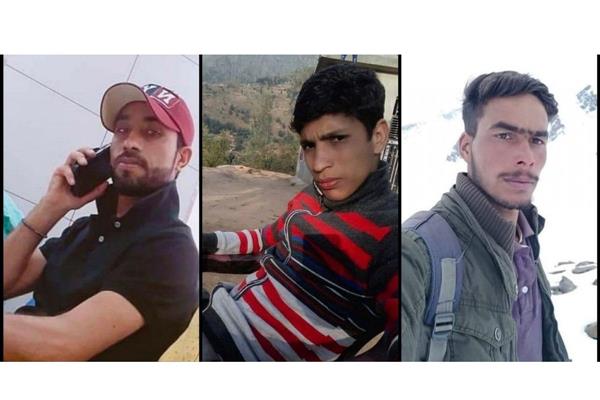Political leaders in Pakistan’s Gilgit-Baltistan (GB) are pitching for the region to become the country’s fifth province following the provocative move by India last year to abrogate the contentious Article 370 from Jammu and Kashmir.
Gilgit Baltistan was earlier known as the Northern Areas and once part of the erstwhile state of Jammu and Kashmir, the region has been under Pakistani control since 1947.
However, since New Delhi on Aug. 5 revoked the special status hitherto enjoyed by its side of Kashmir and further split it into two federally administered territories, many residents of Gilgit Baltistan are urging Islamabad to fully incorporate the region as a full-fledged province of Pakistan.
“We’re patriotic Pakistanis as our elders liberated this region from Dogra rulers in 1947 and no one here [GB] is ready to accept the Indian claim over Gilgit Baltistan,” Muhammad Ali Khan, the provincial minister of GB, told Anadolu Agency.
“From day one we merged with Pakistan and now the government should declare this region a fifth province of the country,” he added.“You can watch the Pakistani flag on houses and buildings in the region, which show our people’s decision,” said, pointing to the banners hoisted on local residents’ houses and buildings, on Aug. 14 Pakistan’s Independence Day.
Why provincial status for Gilgit Baltistan?Currently, much of administrative power related to the region rests with the Federal Ministry of Kashmir Affairs and Gilgit-Baltistan, including the final say on all regional legislation and policies.“The government of Pakistan has granted limited powers to GB. However, much power still rests with the Ministry of Kashmir Affairs and Gilgit-Baltistan,” Khan said.
The region also has no representation in the national assembly, nor in the country’s senate.In 2009, then-President Asif Ali Zardari had granted limited autonomy and renamed the region from the Northern areas to Gilgit-Baltistan. Under the 2009 Gilgit Baltistan Empowerment and Self Governance Order, the region received a status similar to provinces and created its own provincial assembly with offices of governor and chief minister. However, the chief minister and provincial assembly have limited powers.
“The full provincial status would provide opportunities of jobs, development and much power to the local government and would pave the way for local youth to join the civil service and serve their region. Currently, all senior officers in all key posts in GB are from other provinces,” Naveed Akbar, a local student from Karakoram University, said.
“If India has scrapped the special status of Indian-occupied Kashmir and divided it into two union territories, then why isn’t Pakistan stepping up to declare GB its fifth province?” Akbar asked.
Political leaders also want to abolish the Gilgit-Baltistan council and transfer its powers to a Gilgit-Baltistan Assembly, as well as eliminate the role of the Ministry of Kashmir Affairs.Tax-free zoneCurrently, the GB region enjoys the status of a tax-free zone and the local government has no power to introduce taxes in the region, while the federal government subsidizes wheat and petroleum products for locals.
“Without taxes, no government can run and develop its region. When I introduced some taxes, local people resisted and the federal government withdrew the order,” said Hafiz Hafeezur Rehman, former chief minister of GB, adding that the regional government also could not enact legislation.
Gilgit Baltistan as special provinceAccording to Rehman, the federal government of Pakistan can impart full provincial status to the region by amending the constitution.
“I think it would not be difficult for the government to give interim or special provincial status to GB, subject to a plebiscite to be conducted under UN resolutions,” said Rehman, who completed his five-year tenure on June 23.
The full provincial status would empower GB assembly to legislate and the local government to make its own policy decisions for the development of the region, he explained.Kashmir, a Muslim-majority Himalayan region, is held by India and Pakistan in parts and claimed by both in full. A small sliver of Kashmir is also held by China.
Last year, Pakistan’s top court ordered the government to grant fundamental rights to residents of GB and ruled that the powers of the top court also extended to the region. However, the federal government is concerned that the integration of Gilgit Baltistan could jeopardize its demands for the dispute surrounding Kashmir to be resolved according to UN resolutions.
“We granted administrative autonomy to the regions of Azad Jammu & Kashmir and Gilgit-Baltistan, which was the demand of the local people during our government but declaring the region as a full province of the country could weaken our principled stance on the Kashmir dispute. Because, Jammu and Kashmir’s future has to be decided by a plebiscite as declared in UN Security Council resolution” said Ahsan Iqbal, a former Interior minister of Pakistan.
However, Iqbal added: “It is possible to grant interim provincial status to the region through constitutional amendments.”
With inputs from EurAsian Times
(Except for the headline, this story has not been edited by Kashmir Today staff and is published from a syndicated feed.)



